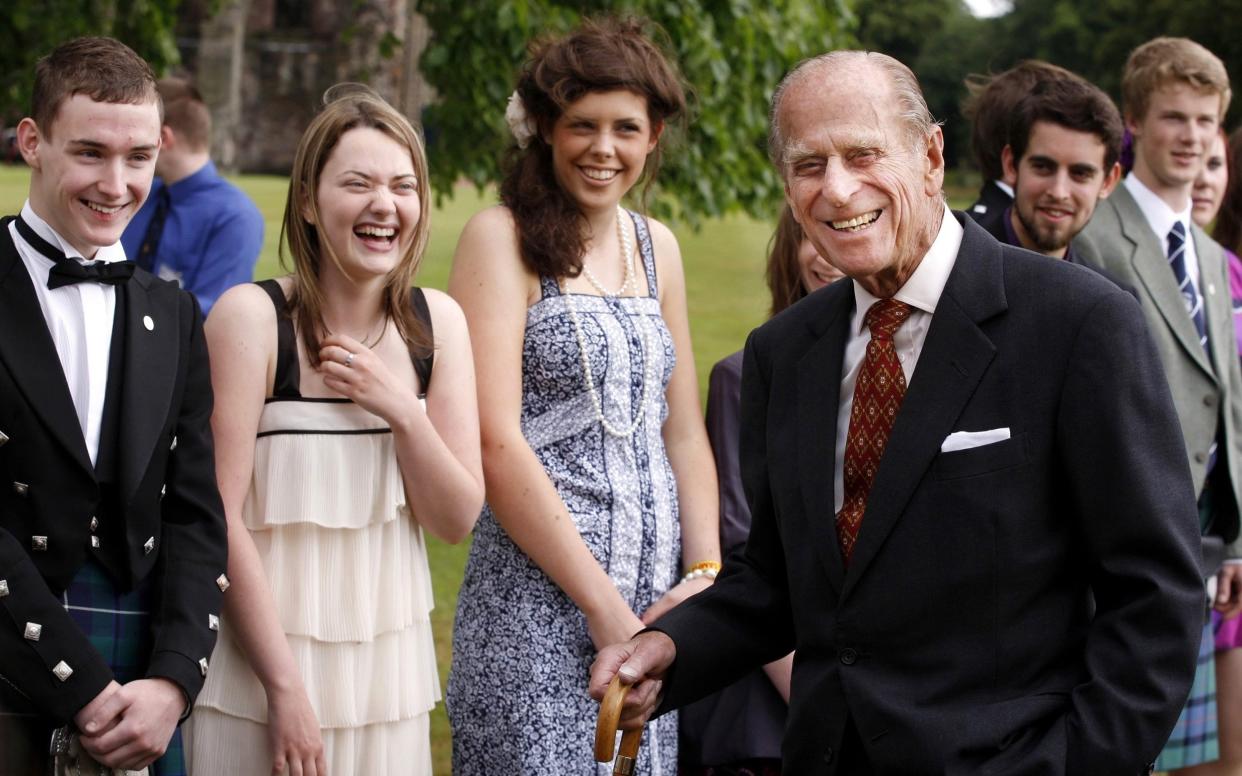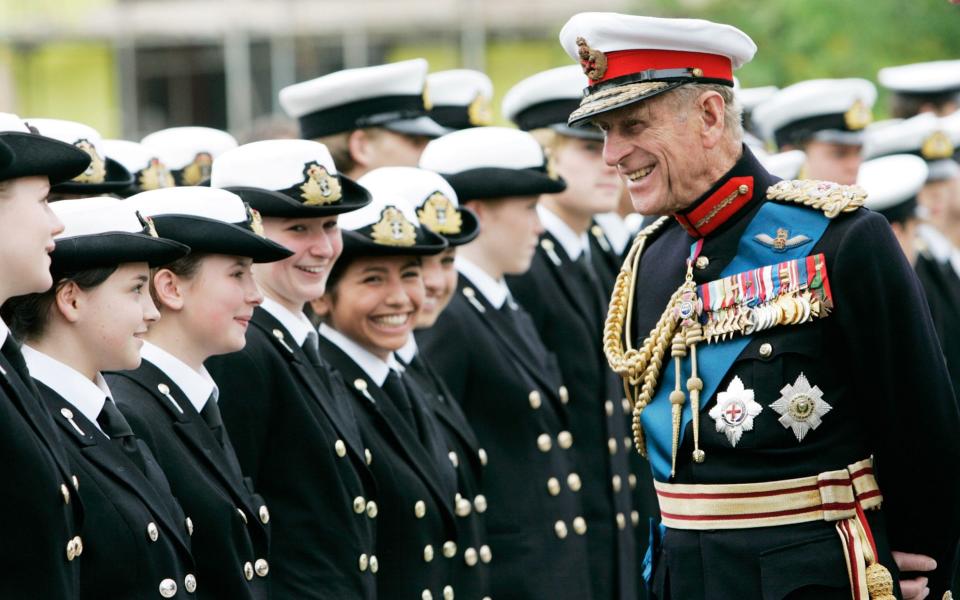The Duke of Banter: How – and why – Prince Philip mastered the art of the one-liner

- Oops!Something went wrong.Please try again later.
- Oops!Something went wrong.Please try again later.
- Oops!Something went wrong.Please try again later.
- Oops!Something went wrong.Please try again later.
Looking over the many, many tributes paid to the Duke of Edinburgh since his death last Friday, there were certain sentiments we always knew might crop up again and again. He was a man of duty and service, everyone understandably repeated; he was fiercely loyal to his wife and Queen, they rightly chorused; he had a quiet dignity and warm heart.
But they also almost all mentioned how the Duke was a relentless, fabled joker. In his comments in parliament yesterday, Boris Johnson, who must surely hope somebody says this about himself one day, admitted Prince Philip “occasionally drove a coach and horses through the finer points of diplomatic protocol [but] they overwhelmingly understood that he was trying to break the ice, to get things moving, to get people laughing and to forget their nerves.”
Barack Obama, meanwhile, noted the Duke’s “sharp wit and unfailing good humour.” Joanna Lumley called him “very funny and very sharp.” The Duke of Cambridge mentioned “his mischievous sense of humour.” And to the Duke of Sussex, he was simply “a legend of banter.”
While that particular phrase sounds more like it is destined for the back of a university hockey tour hoodie than a eulogy, in a way Harry’s comment may have said it best of all. The Duke of Edinburgh’s longevity, duty and service will be remembered in history, but as a character, it is likely to be his wit that goes down in legend.

We’ve all heard the hits. The (possibly apocryphal) “Where did you get that hat?” to the Queen upon her coronation. “If it doesn’t fart or eat hay, she’s not interested,” about his eldest daughter, Princess Anne. “What do you gargle with, pebbles?” to Tom Jones. And the much-reported comments to locals overseas, when the Duke arguably drove a horse and carriage through the line between “banter” and “offense”.
But there is no doubt that he was funny, and the Duke’s arid sense of humour – married to a po-faced delivery – served him perfectly in his unique role as not quite a politician, not the sovereign of heir, but (in his words) “just a bloody amoeba.” For all its positives, being a Royal is also faintly absurd, and he knew that all too well.
He also knew that anybody in his company was likely feeling anxious about making a mistake or saying the wrong thing. So he got in there first, diffusing any unspoken tension with a quip. Admittedly, after a few decades of those ice-breakers – often at the expense of his guests or hosts – the expectation they’d be victim of a joke probably only added to people’s nerves.
Alastair Bruce, the royal watcher and Governor of Edinburgh Castle, posted a video on Twitter this morning of the Duke giving a speech to the National Press Club in Washington DC in 1990. The room might have expected a brief, clipped set of remarks about the importance of journalism or the ‘special relationship’. Prince Philip, however, who was unusual among royals by always insisting he wrote his own speeches, was never going to be boring – or predictable. What they got was a solid two-minutes of self-deprecating, anecdote-laden stand-up, complete with one story about visiting Japan that possibly wouldn’t get past PR approval in 2021.
The #DukeOfEdinburgh in #USA remembers with humour. @SkyNews @ABC pic.twitter.com/IMFSusiJoJ
— Alastair Bruce (@AlastairBruce_) April 12, 2021
“Banter” – a word long-ago lost to lad culture, now used principally by boys in public school common rooms, and Prince Harry – seems to be something Prince Philip thought about deeply.
As my colleague Jake Kerridge has pointed out in an overview of the Duke’s books today, “there is a genuine epigrammatic wit to his writing, and he writes eloquently about the importance of using humour in the discussion of serious issues, even if it doesn’t always come off: “Trying to be funny is a great deal more difficult than trying to be serious. What may strike me as a witty comment can easily turn out to be painfully tactless.”
And plenty were painfully tactless, which evidently bothered the Duke throughout his life more than many of us realised. At just 21, he wrote to a relative whose son had been killed in the war, saying: “I know you will never think much of me. I am rude and unmannerly and I say many things out of turn, which I realise afterwards must have hurt someone. Then I am filled with remorse and I try to put matters right.”

He didn’t always feel like that. “I am rude,” he later said, “but it’s fun.” Quips like, “I declare this thing open, whatever it is,” as he unveiled yet another plaque in Canada in the 1960s, didn’t so much mock his hosts as his own role. And of his choosing the Navy over the Army, he said: “I didn’t particularly want to go into the Army – I didn’t fancy walking much.” This, from a decorated veteran and the founder of the Duke of Edinburgh Award. Which involves a fair bit of walking.
Members of the Royal Family aren’t necessarily known for their japes. People tend to say that the Queen is a hoot, but we’ll never see that side of her in public. Few would wish to see a Netflix stand-up special from Prince Edward. And while some of the grandchildren – not least Prince Harry and Zara Tindall – seem to enjoy a laugh, we don’t get many laugh-out-loud moments from them. Could it be that the next generation supplies another court jester? Baby Louis does seem cheeky…
Of course, what we know of the Duke’s wit is what has been heard or shared in public. His most amusing moments, which likely contribute far more to his grandson’s appraisal that he was a “legend of banter” than anything said publicly, surely came behind closed palace doors, with family and friends, reading the paper, watching television, and just going about his business. Maybe one day we’ll hear those gems. Or perhaps they’re best left to legend.

